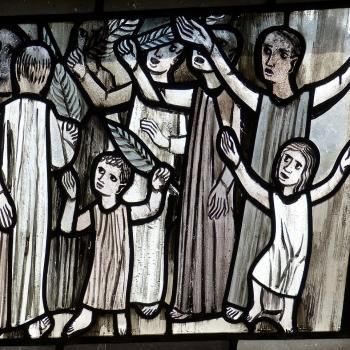I am in the middle of reading fifty 4-6 page papers from the students in my two sections of General Ethics. It’s a slog because there are so many of them, but they are engaging with some seminal questions about the moral life and about our commitments to actually acting on what we claim to believe. What would happen if we actually took the things we claim to believe seriously enough to do something about them? Seriously enough to completely change our lives?

Katie is a “good person”—doctor for the National Health Service, mother, wife, and socially aware—but is desperately unhappy with her life. Her husband David is angry and cynical; he writes a newspaper column called “The Angriest Man in Holloway” in which he pillories everything from old people who walk too slowly getting off the bus to overrated artists like Sting and The Beatles. Katie and David’s marriage is in trouble, their kids are spoiled and ungrateful, they live in an upper middle class neighborhood but know few of their neighbors, they are comfortable but are surrounded by poverty and homelessness, moral demands are flying at them from all sides. Katie is having an affair, which she blames on her overall unhappiness. She wants a divorce, which David refuses to agree to.
This is the setup for Nick Hornby’s hilarious and insightful novel How to Be Good, the novel that is the jumping off text for the papers I am currently reading. What makes the novel particularly interesting is that within the first fifty pages, under circumstances better read about than described (you really should read the book!), David undergoes a mysterious moral transformation from a cynical and nasty piece of work to a dedicated moral and social activist.
David and Katie have paid lip service to all of the appropriate liberal political and social positions ever since they met at university, but now David is sounding as if he intends to actually act on what they have always lazily claimed to believe. How is Katie to respond? How is she to cope with a husband who is suddenly attentive, pleasant, no longer angry, sharing his portion of the parenting burden without complaint . . . and who intends to turn their lives upside down? Katie is nervous, because “I can’t help but feel that all this sounds very ominous indeed.”
About a third of the way through the book, David lays it all out:
We don’t care enough. We look after ourselves and ignore the weak and the poor. We despise our politicians for doing nothing, and think that this is somehow enough to show we care, and meanwhile we live in centrally heated houses that are too big for us . . . We have a spare bedroom, and a study, and meanwhile people are sleeping outside on pavements. We scrape perfectly edible food into our compost maker, and meanwhile people at the end of our road are begging for the price of a cup of tea and a bag of chips . . . We spend thirteen pounds on compact discs which we already own in a different format . . . We buy films for our children that they’ve already seen at the cinema and never watch again . . .
You get the point . . . and so does Katie. At the end of his diatribe, David sums up succinctly.
I’m a liberal’s worst nightmare . . . I think everything you think. But I’m going to walk it like I talk it.
In short order David gives many of his children’s toys and one of the family’s three computers away, seeks to recruit families on their street to shelter homeless teenagers in their spare bedrooms, and generally disrupts house and home in an effort to walk the talk. The problem is that David’s logic is unassailable. If this is what we claim to believe, then this is what we should be doing.
Which monumentally frustrates Katie who, after all, has considered herself to be the “good person” in this marriage for years.
I want to destroy David’s whole save-the-world-and-love-everyone campaign, but I want to do it using his logic and philosophy and language, not the language of some moaning, spoiled, smug, couldn’t-care-less, survival-of-the-fittest whiner.
I share many of Katie and David’s beliefs; while theirs seem to have been established primarily through education, peer pressure, and social class, I often trace most of my liberal moral and social commitments back to my professed Christian faith. Which raises disturbing to a different level, because a person of faith who actually put the fundamental tenets of the faith into daily practice would be a Christian’s worst nightmare.
I run headlong into this challenge every time I read or hear the Beatitudes and the rest of the Sermon on the Mount. For the beauty and familiarity of the language can easily disguise what is most remarkable about the Beatitudes—they are a crystal clear call to radically uproot everything we think we know about value, about what is important, about prestige, about power, and even about God. They are a challenge to fundamentally change the world.
The Roman-dominated world into which the Sermon on the Mount came like a lightning-bolt was not that different from our own. One’s status or rank in the social hierarchy depended on power, birth, economic status, education, gender, race—usually some combination of the above. Those who lacked these qualities, whether through their own fault or because of matters entirely outside their control, had little opportunity to rise above their lowly state. And this, it was assumed then as it often is now, is simply the way of the world, the way things work.
In a matter of a few brief, poetic lines Jesus turns it all upside down. In God’s economy, none of our assumptions can be relied upon and none of our common sense arrangements work. God’s values are apparently the very opposite of those produced by our natural human wiring. Throughout virtually everything attributed to Jesus in the gospels, the point is driven home. God is most directly found in the poor, the widows, the orphans, those for whom pretensions of being something or having influence are unavailable. The gospels are clear that the one thing guaranteed to make God angry is to ignore such persons.
The infrequent times that Jesus talks about hell is always in the context of people who spend their life ignoring the unfortunate. Because in truth we all are impoverished, we all are abandoned, we all are incapable of taking care of ourselves, let alone anyone else. The poor, widows and orphans simply no longer have the luxury of pretending otherwise.
Every once in a while a debate develops, usually somewhere in the South, over whether it is permissible to put a plaque or a statue containing the Ten Commandments in a law court, a state house, or a public school. Because of the commitment to separation of church and state established in the United States Constitution, such attempts are invariably rejected as unconstitutional. And this is a good thing—I’m very grateful for the sharp separation of church and state.
But imagine a community or a society with governing practices and policies infused with the energy, not of the Ten Commandments, but of the Beatitudes. Imagine a legislative body whose guiding north star was the mercy and compassion of the Beatitudes rather than the cold and clinical justice of the Ten Commandments. How would such a community’s or society’s attitudes and policies concerning the poor, the disenfranchised, those who are struggling, those who have fallen through the cracks, change as it learned to see such “unfortunates” not as a problem, but rather as the very face of God? A vision of beauty? Or our worst nightmare?

















